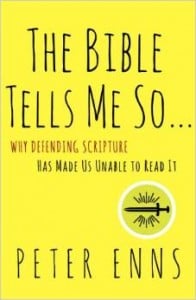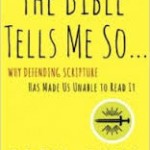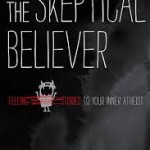 Writing books and having them reviewed go hand in hand. I bet book reviews go back to whatever third millennium BCE Sumerian priest carved into clay the first flood story and his rival priests who felt “He really could have done a better job.” Like most authors, I normally sit back and let my books stand on their own and learn what I can.
Writing books and having them reviewed go hand in hand. I bet book reviews go back to whatever third millennium BCE Sumerian priest carved into clay the first flood story and his rival priests who felt “He really could have done a better job.” Like most authors, I normally sit back and let my books stand on their own and learn what I can.
But after reading the recent review of The Bible Tells Me So in Christianity Today by Andrew Wilson (a doctoral student in New Testament and sometime contributor to Christianity Today), I am compelled to offer a response—of sorts.
I have a number of disagreements with various matters of content (relevant ones I outline below), but I’m not particularly motivated to respond to Wilson’s review point by point. Wilson expressed his view, and he is as welcome to do so as I am when I review books. And readers are quite capable of determining what helps and what doesn’t.
Rather, I am motivated to respond because Wilson’s review is symptomatic of a larger problem: how a movement’s intellectual leaders, while appearing to do otherwise, manage to avoid engaging in a much-needed dialogue over well-known problems in scripture that keep coming up and aren’t going away.
Specifically, I have observed over the years that, when conservative evangelicals defend the Bible against perceived attacks, they enlist into service a number of stock responses and deflective rhetorical strategies.
Rhetorical skills, of course, are an honored and ancient component of persuasive speech, and good writers are good at it. But in my experience, a number of rhetorical strategies as employed by evangelicals too often simply amount to stall tactics that deflect attention and/or delegitimize the challenges themselves and those who raise them.
These strategies—which are not necessarily deployed consciously—are aimed at protecting evangelical theological boundaries but do so at the expense of those evangelicals, who, through the course of reading and studying scripture, come upon legitimate questions for which they are seeking thoughtful answers. Issues like the tribal violence of God, true (not apparent) contradictions, and historical problems are quite real and cannot long be kept at bay through these strategies.
Although intended, no doubt, as a defense of the faith, these strategies often have the exact opposite effect. They are compelling only to those who are content with the “assured results of evangelicalism” and so are a discouragement to those who, for the sake of their own spiritual survival, are seeking ways forward that are more intellectually and spiritually sustainable.
Here are 12 rhetorical strategies that I have seen employed past and present. Again, I am highlighting Wilson’s review, largely because it appeared in evangelicalism’s flagship publication, to illustrate the larger problem noted above.
Also, I wish to make quite clear that Wilson’s review does not display all 12 of these strategies, and even where he does he is not the worst offender. Compared to one or two other reviews of The Bible Tells Me So, I am happy that Wilson at least sees some of the same problems I do and made an attempt to step into my skin and see what I am trying to accomplish.
12 Rhetorical Strategies
- The book is interesting, and I even agree with the author now and then. Unfortunately, he’s completely wrong in anything that actually matters. Complimenting the author early on gives greater credibility to damning criticism of the author’s key points raised later. (“The reviewer was so fair and sympathetic earlier; he can’t be wrong now.”)
- Though the author is one-sided and biased, I will offer the balanced center. Painting one’s own views as representing the balanced, rational, and truly scholarly middle rather than an opposing view presents the author as extremist or incompetent
- Back to your homes, folks. Nothing new to see here. The alleged “problems” raised are actually old hat, nothing more than “standard” attacks on the Christian faith that have been successfully thwarted in the past, and therefore can and should be immediately ignored. All truly competent and enlightened people know all this was dealt with years ago.
- Not only is the author wrong, but he is obviously wrong. Related to #3, a passing recognition is given that there is some sort of problem, but, thankfully, it can easily be explained after a moment’s sober reflection.
- If the author is right, then my theological tradition is wrong. And we can’t have that. The reviewer’s theological views, rather than offered as a perspective from which to engage a book, are asserted/assumed to be the non-negotiable and self-evident standard for judging the book.
- Good books on scripture need to address issues my community and I think are of central importance. This follows on #5, for example, “How can a book that talks about the Bible not give a full account of how exactly revelation and biblical authority work?” or “How can an author who wrote a book about the Bible not lay out for us fully his/her doctrine of inspiration, especially dealing with our favorite proof text, 2 Tim 3:16?”
- I’m just shocked…shocked, I tell you. Registering bafflement and plain incredulity creates a sense of outrage and portrays the author’s views as bizarre and therefore easily dismissed.
- Quote after quote after quote. Good reviews should quote the book, but their use does does not automatically mean the book has been (1) read carefully and (2) understood.
- A famous scholar with great social capital for our side is against you. The argument from authority. (“C.S. Lewis would laugh at this.”)
- The Bible is against you. Even one biblical citation—whether valid or not—can create the impression that a view has been sufficiently critiqued. “Warning passages” (Acts 7:51-53, for example) that invoke judgment are particularly effective.
- In fact, Jesus himself is against you. If at all possible to do so, claiming that Jesus’s words counter the author’s is a powerful tool, as it raises not simply the possibility of the author’s biblical illiteracy (#10) but the specter of spiritual rebellion.
- This sure sounds like Rob Bell (or a 19th century liberal, or Hitler, or Marcion, or Satan). Appealing to a figure whose mere mention fully marginalizes and delegitimizes the author beyond repair in the eyes of the readers can be hard to recover from.
Let me illustrate a few of these rhetorical strategies (RS) from Wilson’s review.
Seeing Several Rhetorical Strategies at Work
After some show of appreciation and even agreement (RS 1), Wilson begins the substantive portion of his review.
Yet the book is also fundamentally imbalanced. Enns is so eager to show how “messy” and “weird” the Bible is that he frequently exaggerates difficulties, presents a one-sided picture, or neglects obvious resolutions to the “contradictions” he puts forth.
The book is not just imbalanced, but fundamentally so, and I am eager (apparently going out of my way) to find problems in the Bible where no balanced, even-handed reader would. The book is therefore prone to frequent exaggeration and I am apparently unaware of or incompetent to recognize how obviously the problems I cite can be resolved.
In the span of two short sentences, rhetorical strategies 2-4 (at least) are succinctly woven together and set the stage for the remainder of Wilson’s assessment.
Wilson backs up his claim by referring his readers to three egregious missteps. Note, though, that in all three cases, Wilson actually acknowledges that there is some problem in the Bible that needs to be addressed—though his quick and ready solutions really do little more than dismiss the gravity of the issues with a simple wave of the hand and an exasperated sigh (mainly RS 3 and 4).
First, Wilson notes that the “contradictions” in the Passover laws in Exodus and Deuteronomy (whether the lamb should be roasted or boiled, The Bible Tells Me So, pp. 161-62) are in fact no such thing, but easily explained: “the former [Exodus] are given for life in the wilderness, and the latter [Deuteronomy] for life in the Promised Land.”
This is a common conservative evangelical “solution” to the contradiction, but it fails to take into account the Passover instructions in Exodus 12:21-27, especially verses 24-25 (NRSV):
You shall observe this rite as a perpetual ordinance for you and your children. When you come to the land that the Lord will give you, as he has promised, you shall keep this observance.
Based on Wilson’s appeal to the “easy” chronological explanation, I would have expected to read in Exodus, “You shall observe this ordinance for the time being, until you get into the land and then you stop and let Deuteronomy take over.”
But Exodus does not say this because at this point in the narrative, it is still assumed things will continue to go smoothly and the Israelites will enter the land of Canaan after they leave Sinai to enact the laws given in Exodus 20-23. Wilderness wandering does not become a factor until the rebellion at the border of Canaan in Numbers 14.
I am at a loss why this chronological explanation continues to be repeated, but I suspect it has simply become a widely accepted “truth” that serves its purpose, at least for a while. But this “answer” is at best a temporary calm before the storm and in the meantime does much more spiritual harm than good for those who are seeking a more authentic faith.
Wilson next claims I find “confusion about how many gods there were in the Old Testament.” Actually, I find no confusion [RS 2 and 7] whatsoever. The Bible is quite clear on the matter: ancient biblical writers in the Old Testament assumed the existence of other gods (pp. 150-54), and one would be hard pressed to find biblical scholars who say anything else.
But without breaking stride [RS 3 and 4], Wilson calmly assures his readers that the “gods” were in fact “demons,” even though the Old Testament never says this and Israel’s cultural context doesn’t support it. His citation of Isa 44:6-20 [RS 10] as a proof text is only helpful until you look it up, and citing Paul’s clear monotheism in 1 Cor 8:4-6—which reflects the Judaism of his day—presumes that what Paul as a first century Jew addressed in his Greco-Roman culture can simply be lifted and transported back 1,000 years to Iron Age Israel.
Can the perennial God/gods question in the Old Testament really be explained by this stock answer? (“Give thanks to the God of demons, for his love endures forever”!? –Ps 136:2).
More important, is theological diversity in the Bible really such a deep and troubling problem that earnest reader are asked to resort to these types of strategies to uphold biblical authority and revere it as God’s word? Does this build up faith or crush it?
Do not these idiosyncratic solutions make faith seem a fragile thing that cannot bear up under closer scrutiny, rather than a faith that welcomes and demands the best our minds can offer?
Third, Wilson charges that I am not only failing to see obvious answers to alleged contradictions [RS 4], but my paraphrases of biblical laws (p. 161), “sometimes create discrepancies out of thin air. Nobody but Enns, surely, could read Leviticus 17:15-16 as … conflicting with instructions elsewhere” [RS 2 and 7].
At this point in the review I stopped reading and took a slow walk. I’m not sure what can inspire Wilson’s confident claim that my overactive mind is conjuring up problems. The contradiction between laws of eating (or not eating) animal carcasses is not a discrepancy I or anyone else created out of thin air, but a common problem raised in these discussions.
Leviticus 17:15: Any person, whether citizen or stranger, who eats what has died or has been torn by beasts shall wash his clothes, bath in water, and remain unclean until evening; then he shall be clean.
Exodus 22:30: You shall be a holy people to Me; you must not eat the flesh torn by beasts in the field; you shall cast it to the dogs.
Deuteronomy 14:21: You shall not eat anything that has died a natural death; give it to the stranger in your community to eat, or you may sell it to a foreigner. For you are a people consecrated to the Lord your God.
What Leviticus allows (“Any person…who eats”) is expressly disallowed in Exodus and Deuteronomy (“you must not eat…you shall not eat”). The contradiction is real and, ironically, is in fact “easily” explained, though not in the way Wilson claims or would probably allow.
Biblical scholars see here evidence of different legal traditions in the Pentateuch that have different theologies of purity. In the priestly literature of Leviticus, only priests are commanded to abstain entirely from animals that have died or been mauled to death. Non-priests may eat but must be purified thereafter. In the non-priestly laws of Exodus and Deuteronomy, however, all Israelites—priests and non-priests—are equally set apart and so all Israelites must therefore avoid both types of dead animals.
This is the “obvious” answer to the problem that accepts the contradiction rather than erases it. This is the kind of answer that honest readers with questions deserve to hear. Whatever subsequent theological questions arise as a result can (and should) be addressed, but at least now we would be walking the proper path of engaging the Bible rather than ignoring it.
Thus far I have only addressed problems with the first paragraph of the review. I don’t want to belabor the point, but I would like to illustrate briefly two other common strategies that come up further along.
Jesus and Rob Bell [RS 11-12]
Wilson agrees with me that Jesus is not a modern reader of his Bible but handled scripture creatively as did other Jews in that context. Yet Wilson feels I have gone “too far” and need to be balanced, since I have “largely ignore[d] the dozens of texts in which Jesus speaks about Scripture as authoritative, unbreakable, true, unchangeable” [RT 2, 4, 11].
Wilson rightly acknowledges Jesus’s creative, Jewish (and very non-evangelical) way of reading his Bible, but then—perhaps sensing Jesus might be getting out of hand—appeals to Jesus’s many statements of scripture’s authority as a balance to what he just acknowledged. In doing so, Wilson has created the impression that Jesus is, after a moment’s reflection, really in line with conservative evangelical ways of thinking.
What troubles me here not a little is that Wilson is a NT doctoral student, which might lend credibility to this claim in the eyes of some readers [shades of RS 9]. But Wilson here reflects an unfortunate yet common Protestant move—distancing Jesus from his Jewish environment and making him sound more like us, something the last generation or two of New Testament scholarship has been trying to correct, and with great success overall.
We can’t pit Jesus against Jesus like this. His view of biblical authority is part of his Jewish heritage and expressed by his creative handling of scripture. The former is not diminished by going “too far” with the latter.
As paradoxical as it might seem to us, Jesus’s creative reading of scripture was how he, consistent with his tradition, showed reverence for scripture (e.g., see Michael Fishbane’s Biblical Interpretation in Ancient Israel). This was the central point I made in chapter 5.
Jesus’s Jewish reading of his scripture cannot simply be acknowledged in one breath and neutered in the next. It is not an old sweater we can strip off him and discard to see the real evangelical friendly Jesus hiding beneath. Actually, Jesus’s view of the Bible is more a problem for evangelicals than a confirmation.
Similarly, Wilson sees as “even more problematic” the fact that I am so bothered by God’s violence in the Old Testament, whereas Jesus clearly is not [RS 4, 11]. But again, playing the Jesus card won’t help.
I spend 41 pages in The Bible Tells Me So discussing God’s command to exterminate the Canaanites, and I have yet to hear a compelling defense for how that portrait of God—which includes enslaving women and children as spoils of war—fits like a glove with the God Jesus reveals to us, as if there is no theological discontinuity from the Old Covenant to the New.
Jesus and his teachings about God are what make Canaanite extermination (and other portraits of violence) such a pickle for not only Christian readers today but going back to the first allegorists of the early Christian church. If appealing to Jesus like this worked so well, we would have all figured that out by now.
Wilson ends his review by finally revealing the true and deeper problem with my approach to scripture: I do not “tremble” sufficiently before God. Instead, as he puts it, I take “swipes” at scripture. In doing so I am in league with the ever-present evangelical traitor Rob Bell and caving in to progressive elitism such as one might read in The New York Times, ever vigilant to “ditch” casually all the bits of scripture I don’t like [RS 12].
But it is the stock answers channeled above by Wilson that are the true examples of “ditching” passages that get in the way. I see there no posture of trembling before God, but a maneuvering and ignoring of scripture to preserve one’s theology.
Despite the common types of protests represented in this review—of how obvious the solutions are to all but the most stubborn readers, or how most problems are more invented than actual, or how piety and obedience to Christ are at stake for those who raise questions considered valid and even self-evident elsewhere, and that failure to fall in line marks you an enemy of God—the problems of scripture are real, people keep noticing them, and they cannot be marginalized or conjured away by compiling rhetorical strategies and stock answers.
One reason I wrote The Bible Tells Me So was to give alternatives to the very sorts of answers we see perpetuated in this review.
The Deeper Problem Still
Answers to honest, recurring, widespread, and often self-evident, queries about the Bible need to be handled better that what we have seen here because Christian pilgrims deserve better. But beyond this, I think a more fundamental issue is at stake: how we answer the question, “Who is God?”
As a Christian I believe that Jesus is God’s best and final answer that question, and that the scriptures God provided bear witness to the process, debates, and reflections over time surrounding that central question and how Jesus was God’s ultimate answer. This, I feel, is what distinguishes Christians and how we see our Bible.
But some conservative evangelicals want more. They want to say that, yes, Jesus is the ultimate answer to the question of God, but so are all these other answers in the Bible. They have to be. And so it becomes absolutely vital to figure out how all the various answers of our diverse and ancient scripture fit together in some transcendent mysterious integrated way that can only be demonstrated through readings of scripture that wind up being more of a problem than the problems they seek to address.
And so those who see it that way have no choice but to invest themselves into aligning what cannot be aligned, and—judging by how scripture behaves—I deeply believe God does not want us to.
That is a real disagreement over what scripture is and does and reveals, and how we resolve these issues greatly influences not simply how we read the Bible here and there, but how we see the character of the God we worship and pray to and how we shape our lives accordingly.
This conversation is spiritually necessary because the issue of scripture keeps coming up. This is why these rhetorical strategies, perhaps most of all “there’s nothing new here” [RS  3], are so deceptive.
3], are so deceptive.
Yes! Exactly! These issues are nothing new. That is precisely the point. They keep coming up . . . because the familiar explanations and the rhetorical strategies that support them aren’t working. Pretending the issues are small or non-existent, or investing energy to keep people from seeing them, is simply wrong.
Here is the real choice before Christians: Either (1) we force the Bible to fit into a scheme it can’t handle, or (2) we honestly face the Bible God has actually given us and form, reform, and reform again, how we view the Bible on that basis, trusting God along the way.
We simply cannot continue denying, avoiding, and spinning our way out of facing these issues that everyone else seems to see plainly enough if we want to keep our integrity, keep our young people, become more spiritually healthy, and, as I see it, align with God’s intentions.
God’s ways are not as much in our control as we might like to think, and that makes it harder to settle debates, but that is the way God has chosen. Pretending otherwise is not a sign of a strong faith; it is, instead, a sign of a misplaced faith rather than a deeper trust in God’s ability to guide us today. And that is perhaps the last thing evangelical leaders should be modeling for those who are seeking ways of bringing scripture and their faith together.














